
Muzio Scevola is an opera seria in three acts about Gaius Mucius Scaevola. The Italian-language libretto was by Paolo Antonio Rolli, adapted from a text by Silvio Stampiglia. The music for the first act was composed by Filippo Amadei, the second act by Giovanni Bononcini, and the third by George Frideric Handel. Collaborations of groups of composers were common in the 18th century, though this is the only one done in London. Bononcini had written the music for two earlier treatments of this story on his own, works dating from 1695 and 1710.
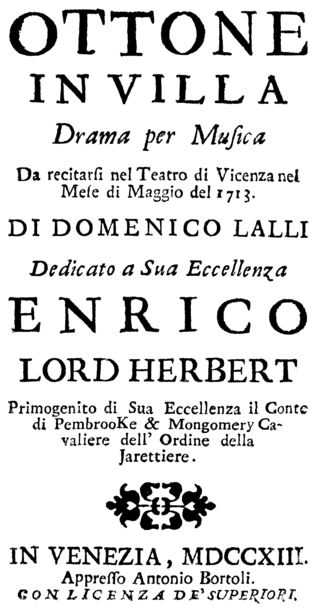
Ottone in villa is an opera in three acts by Antonio Vivaldi to an Italian libretto by Domenico Lalli. It was Vivaldi's first opera and premiered on 17 May 1713 at the Teatro delle Garzerie in Vicenza. Lalli's pastoral drama is set in ancient Rome and was a condensed adaptation of Francesco Maria Piccioli's satirical libretto for Carlo Pallavicino's opera Messalina (1679). However, Lalli changed several of the characters in Piccioli's libretto. Messalina became an invented character, Cleonilla. The Roman Emperor Claudius became another emperor, Otho (Ottone), who had already appeared as a protagonist in Monteverdi's L'incoronazione di Poppea (1642) and in Handel's Agrippina (1709).
Adelaide or l'Adelaide is an opera by Antonio Sartorio to an Italian libretto by Pietro Dolfin. It was premiered in Venice at the Teatro San Salvatore in 1672. An exact date is not known, although the libretto is dedicated February 19, 1672.

Cendrillon is a French opera in three acts by the Maltese-born composer Nicolas Isouard. It takes the form of an opéra comique with spoken dialogue between the musical numbers, although its authors designated it an opéra féerie. The libretto, by Charles-Guillaume Étienne, is based on Charles Perrault's fairy tale Cinderella. The work was first performed by the Opéra-Comique at the Salle Feydeau in Paris on 22 February 1810. Cendrillon was a success throughout Europe until its popularity was eclipsed by that of Rossini's opera on the Cinderella theme, La Cenerentola (1817).
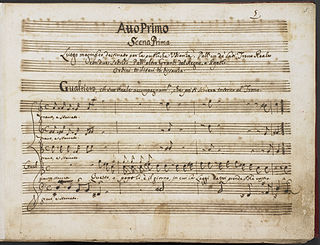
Griselda is an opera seria in three acts by the Italian composer Alessandro Scarlatti, the last of Scarlatti’s operas to survive completely today. The libretto is by Apostolo Zeno, with revisions by an anonymous author. Zeno wrote his work in 1701 and it had already been set by Pollarolo and Antonio Maria Bononcini. It is based on the story of Patient Griselda from Boccaccio's tenth day of The Decameron. Scarlatti's opera was first performed at the Teatro Capranica, Rome, in January 1721 with an all-male cast.
Il Mitridate Eupatore is an opera seria in five acts by the Italian composer Alessandro Scarlatti with a libretto by Girolamo Frigimelica Roberti. It was first performed, with the composer conducting, at the Teatro San Giovanni Grisostomo, Venice, on 5 January 1707. A failure at its premiere, Mitridate Eupatore is now considered one of the finest of Scarlatti's operas.
Tigrane, o vero L'egual impegno d'amore e di fede is an opera seria in three acts by the Italian composer Alessandro Scarlatti with a libretto by Domenico Lalli. It was first performed at the Teatro San Bartolomeo, Naples, on 16 February 1715. It is regarded as one of Scarlatti's finest operas. As well as the serious main plot, there are also comic scenes involving the servants Dorilla and Orcone.

Griselda is a dramma per musica in three acts that was composed by Antonio Vivaldi. The opera uses a revised version of the 1701 Italian libretto by Apostolo Zeno that was based on Giovanni Boccaccio's The Decameron. The celebrated Venetian playwright Carlo Goldoni was hired to adapt the libretto for Vivaldi. The opera was first performed in Venice at the Teatro San Samuele on 18 May 1735.
Griselda is a dramma per musica in three acts that was composed by Giovanni Bononcini. The opera uses a revised version of the 1701 Italian libretto by Apostolo Zeno that was based on Giovanni Boccaccio's The Decameron. The Italian poet Paolo Antonio Rolli was hired to revise the text. Bononcini's opera premiered in London at the King’s Theatre on 22 February 1722. From the opera, an aria "Per la gloria d'adorarvi" is nowadays a famous and popular concert piece, with opera singers such as Oleg Ryabets, or Ramon Vargas.

Didone abbandonata was an opera in three acts composed by Tomaso Albinoni. Albinoni's music was set to Pietro Metastasio's libretto, Didone abbandonata, which was in turn based on the story of Dido and Aeneas from the fourth book of Virgil's Aeneid. The opera premiered on 26 December 1724 at the Teatro San Cassiano in Venice and was the first time that an opera based on a Metastasio libretto was performed in Venice.

Didone abbandonata is an opera in three acts composed by Domenico Sarro to a libretto by Pietro Metastasio of the same name which was based on the story of Dido and Aeneas from the fourth book of Virgil's Aeneid. The opera premiered on 1 February 1724 at the Teatro San Bartolomeo in Naples.

Il prigionier superbo is an opera seria in three acts, composed by Giovanni Battista Pergolesi to a libretto attributed to Gennaro Antonio Federico, and based on an earlier libretto by Francesco Silvani for Gasparini's opera, La fede tradita e vendicata. It was premiered at the Teatro San Bartolomeo in Naples on 5 September 1733 and received further performances in October. The opera, with its labyrinthine plot involving the rivalry of Metalce and Viridate for the hand of Rosmene, soon sank into oblivion, but its comic intermezzo, La serva padrona was to achieve considerable success when performed on its own.

Carlo Scalzi was an Italian castrato who had an active performance career in major opera houses in Italy from 1718-1738. He was also heard in London in 1733–1734 where he notably created the role of Alceste in the world premiere of George Frideric Handel's Arianna in Creta. The librettist Pietro Metastasio described Scalzi as a "very unique singer" and likened his voice to that of the famous castrato Farinelli.
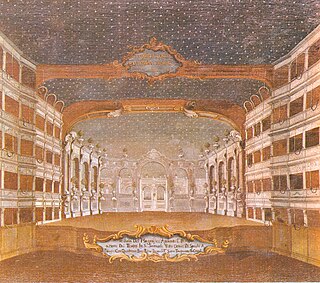
Teatro San Samuele was an opera house and theatre located at the Rio del Duca, between Campo San Samuele and Campo Santo Stefano, in Venice. One of several important theatres built in that city by the Grimani family, the theatre opened in 1656 and operated continuously until a fire destroyed the theatre in 1747. A new structure was built and opened in 1748, but financial difficulties forced the theatre to close and be sold in 1770. The theatre remained active until 1807 when it was shut down by Napoleonic decree. It reopened in 1815 and was later acquired by impresario Giuseppe Camploy in 1819. In 1853 the theatre was renamed the Teatro Camploy. Upon Camploy's death in 1889, the theatre was bequeathed to the City of Verona. The Venice City Council in turn bought the theatre and demolished it in 1894.
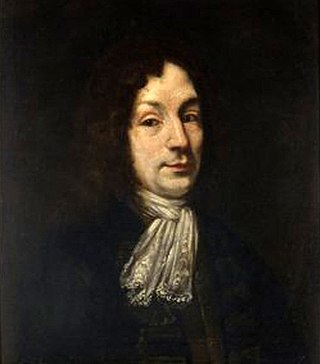
Luca Antonio Predieri was an Italian composer and violinist. A member of a prominent family of musicians, Predieri was born in Bologna and was active there from 1704. In 1737 he moved to Vienna, eventually becoming Kapellmeister to the imperial Habsburg court in 1741, a post he held for ten years. In 1765 he returned to his native city where he died two years later at the age of 78. A prolific opera composer, he was also known for his sacred music and oratorios. Although his operas were largely forgotten by the end of his own lifetime and most of their scores lost, individual arias as well some of his sacred music are still performed and recorded.
Griselda is a feminine given name.
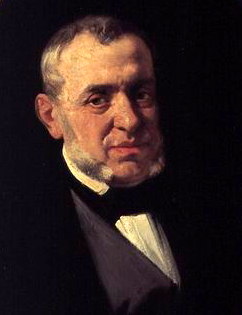
Caritea, regina di Spagna, ossia La morte di Don Alfonso re di Portogallo, is an opera in two acts by Saverio Mercadante, with a libretto by Paolo Pola. It was premiered at Teatro La Fenice in Venice on 21 February 1826.

Semiramide is a dramma per musica in three acts by Antonio Vivaldi composed to a libretto by Francesco Silvani.
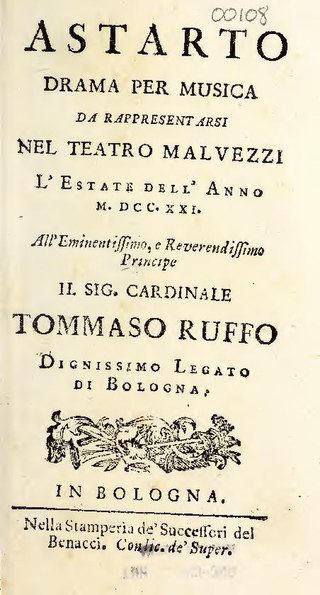
Astarto is an opera in three acts by Giovanni Bononcini to a libretto by Paolo Rolli, after Apostolo Zeno and Pietro Pariati. It was premiered in January 1715 in Rome at the Teatro Capranica, then revised for the King's Theatre, Haymarket, in London on 19 November 1720 with contralto castrato Senesino.















